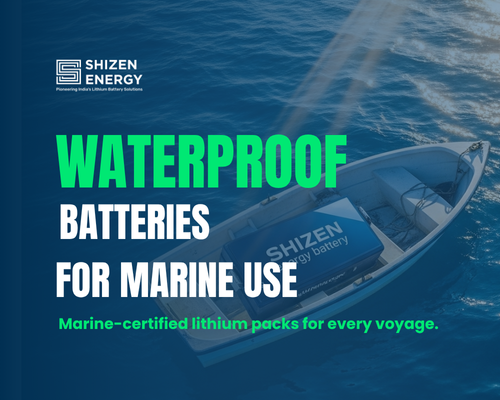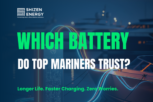
Powering the future of marine applications
The marine environment is one of the most challenging in the world. Saltwater, vibration, humidity, weather and moisture take a heavy toll on components in boats, ships and offshore platforms. For years, lead-acid and AGM batteries have struggled to keep up with the demands of the high seas, often failing prematurely from water damage, corrosion, and general wear.
As marine engineers, boat owners, and OEMs look to more reliable, efficient and sustainable power, a high-performance, long-life, fast-charging lithium battery is quickly becoming the new standard in marine power applications.
The Challenge: Why Traditional Marine Batteries Fall Short
Every marine professional has experienced their share of battery problems. From stranding at sea due to water ingress, to increased weight, and high lifecycle costs from lead-acid and AGM batteries. In a high humidity saltwater environment, safety and energy density issues also become a significant concern.
Yet, many remain unaware of the capabilities of marine-certified lithium batteries and continue to work with outdated power solutions.
What makes a Battery “Marine-Grade”?
A lithium battery pack for marine use is specifically designed with the rigorous demands of the marine environment in mind. In addition to the general features outlined previously, a marine-grade battery typically offers the following key features.
- Waterproof Design (IP67/IP68 Rating)
- Vibration and Impact Resistance
- Anti-Corrosion Housing
- Smart Battery Management System (BMS)
- Certifications
Each of these aspects is critical for ensuring safe, reliable and efficient operation of lithium batteries in boats, ships, and offshore platforms.
Waterproof Design (IP67/IP68 Rating)
The most common cause of battery failure out at sea is water damage. Waterproof lithium batteries for boats are designed to IP67 or IP68 rating to ensure water will not enter the unit during rough sea spray, heavy rain, or even flooding. This means the battery is safe to use in bilge areas, deck lockers or in exposed engine rooms. Shizen Energy India’s marine-grade lithium packs are designed with these features in mind.
Vibration and Impact Resistance for Rough Waters
It’s just a fact of life, boats and ships move all the time. Due to the constant movement, impact and vibration from waves and engines can lead to internal battery plate damage and loose connections in a typical battery. A vibration resistant battery for marine use has reinforced internal battery structures and shock absorbing mounts to keep batteries running strong even in the roughest of seas or on high-speed craft.
Longer Life Cycles = Lower Operational Costs
As mentioned earlier, one of the most significant benefits of a lithium battery for marine applications is its longer lifecycle. Most lead-acid batteries are rated for only 300–500 cycles, while a marine-grade lithium battery can often last 2,000–5,000 cycles or more. This longer service life means years of reliable service, fewer battery replacements, and a much lower total cost of ownership for commercial and fleet operators.
Smart BMS for Safety in Harsh Environments
Safety first, as the saying goes. The safety of lithium batteries in harsh marine conditions is ensured through an intelligent BMS that constantly monitors the battery’s temperature, voltage, and current. These smart lithium batteries provide active protection against dangerous events such as overheating, overcharging, deep discharge and short circuits, all crucial safety features in a high humidity saltwater environment.
Fast Charging and Weight Advantage vs AGM/Lead-Acid
Lithium vs AGM marine battery: A lithium battery charges up to 4 times faster than either AGM or lead-acid type batteries. This can be a critical factor for marine applications where minimizing downtime and maximizing vessel availability is critical. Lithium batteries are also much lighter, typically 60% less than a lead-acid or AGM alternative. This results in significant weight savings, which improves vessel performance, fuel efficiency and handling, and in the case of electric boats, gives longer range and more deck space.
Real-World Applications
Marine-grade lithium battery packs are increasingly used across a range of vessels, platforms, and watercraft.
- Boats and Yachts: From small fishing and personal boats to large luxury yachts, lithium batteries are providing a reliable and safe source of power for propulsion, navigation systems and onboard electrical loads.
- Offshore Rigs and Naval Craft: High-performance marine batteries are finding use in backup power, ROVs and other critical support and supply vessels.
- Fishing Fleets, Ferries, and other Commercial Fleets: Commercial operators are discovering the benefits of reduced maintenance, longer runtimes and enhanced safety.
- EV Marine OEMs and System Integrators: Lithium-ion battery for electric boats are opening up the next generation of clean and efficient marine electric transportation .
Comparison Table: Marine Lithium vs Marine AGM/Lead-Acid:
| Feature | Marine Lithium Battery Pack | Marine AGM/Lead-Acid Battery |
|---|---|---|
| Weight | 60% lighter | Heavy |
| Cycle Life | 2,000–5,000+ cycles | 300–500 cycles |
| Charging Speed | 1–2 hours (fast charge) | 6–10 hours |
| Energy Density | High (more runtime, smaller size) | Low (bulky, less runtime) |
| Waterproof/Vibration-Resistant | Yes (IP67/IP68, reinforced) | Limited |
| Maintenance | Minimal | Regular (water top-up, cleaning) |
| Safety Features (BMS) | Advanced (overheat, short circuit) | Basic |
| Saltwater Resistance | High (anti-corrosion housing) | Low (prone to corrosion) |
| Cost Over Lifecycle | Lower (fewer replacements) | Higher (frequent replacements) |
Frequently Asked Questions
Yes, a true saltwater-resistant battery pack is designed with both anti-corrosion materials as well as being sealed to IP67/IP68 standards for direct operation in saltwater.
Certifications to look for are DNV-GL, ABS, or IEC 62619, as well as IP67/IP68 ratings. It’s also important to only work with a trusted manufacturer such as Shizen Energy India who can provide documentation and testing reports for their marine-grade products.
Yes, in most cases a lithium battery for marine applications is a drop-in replacement for lead-acid or AGM batteries. In general this is true, but it’s still always recommended to double-check compatibility with your boat’s charging systems and work with a marine battery expert or consultant to confirm.
Why Choose Shizen Energy India for Marine-Grade Lithium Solutions?
Shizen Energy India has been manufacturing and supplying high-performance, reliable and innovative energy storage solutions since 2019. A young and agile company, Shizen Energy India’s mission has always been focused on quality, safety and sustainability, a set of core principles that is evident across the company’s marine-grade lithium battery products.
Trusted by OEMs, fleet operators and boat owners across India and beyond, Shizen’s marine batteries are used in the toughest conditions and feature advanced waterproof, vibration resistant and safety technologies.
Ready to Upgrade? Get a Marine Battery Consultation
Don’t get left behind with outdated battery technology. Whether you’re a boat owner, marine engineer or OEM, learn how marine-grade lithium battery packs can power your operations into the future. Contact Shizen Energy India today for a consultation, quote or to explore distribution partnership opportunities. Power your journey with the safest, most reliable and sustainable marine batteries on the market.
For more information or to set up a consultation, contact Shizen Energy India, your partner in powering a cleaner, safer marine future.




